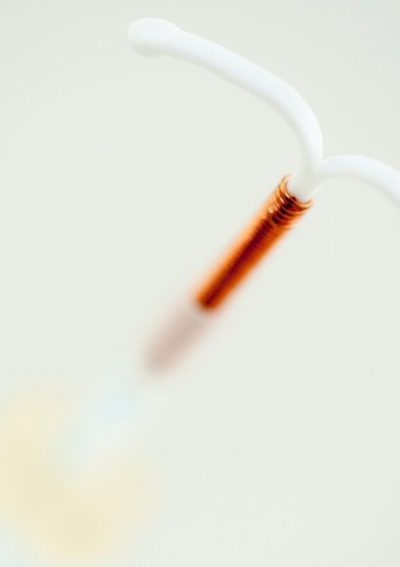Paragard Side Effects
The Paragard IUD is a hormone-free contraceptive known for its effectiveness. However, it may cause side effects like heavier periods, cramping and spotting. Some users experience complications, like device expulsion or breakage, which can lead to serious risks like pelvic infection or ectopic pregnancy.

Common Paragard Side Effects
The Paragard intrauterine device is an effective form of contraception but can cause side effects. Some common Paragard IUD side effects experienced include heavier and more extended periods, with spotting in between, which usually decreases over time.
Other side effects of Paragard may include pain and bleeding upon insertion. Users have also reported experiencing cramping, dizziness, irregular periods, slow heart rate and spotting during removal of the IUD.
- Anemia
- Backache
- Expulsion (complete or partial)
- Pain and cramping
- Pain during intercourse
- Painful periods
- Prolonged periods
- Spotting
- Vaginal discharge
- Vaginal irritation
A 2023 study in Nature Communications found that copper IUDs, like Paragard, can upset the usual balance of bacteria in the vagina. The research also showed that these IUDs are linked to higher levels of inflammation in vaginal tissue compared to hormonal contraceptives.
Serious Paragard Complications and Side Effects
As of March 2025, the FDA Adverse Events Reporting System (FAERS) database showed 23,107 serious complications — including 19 deaths — reported to the agency about Paragard. Expulsion, dislocation and breakage accounted for nearly 60% of all complications reported to the FDA.
- Device Expulsion: 13,839
- Device Dislocation: 10,837
- Device Breakage: 7,466
The Paragard IUD may cause serious complications. Adverse effects include the worsening of existing medical conditions. People with Wilson disease, for example, accumulate excessive amounts of copper in their bodies, so Paragard is inadvisable for them because it contains copper.
- Ectopic pregnancy
- Embedment (Paragard becomes embedded in the wall of the uterus)
- Endometriosis
- Intrauterine pregnancy
- Miscarriage
- Pelvic infection
- Pelvic inflammatory disease
- Perforation (Paragard goes through the wall of the uterus)
- Premature delivery
- Sepsis
A 2023 study published in Obstetrics and Gynecology reported that within the first five years of using Paragard, the risk of expulsion is nearly 5%, and perforation risk is 0.6%. A 2022 analysis in Contraception examining FDA reports of IUD breakage from 1998 to 2022 found nearly double the reports of breakage for Paragard compared to hormonal IUDs. About 10% of Paragard-related problems were due to breakage, versus only 2% for other IUDs.
There are risks if you get pregnant while using Paragard. Severe infection, miscarriage, premature delivery and sometimes death can occur. Because of these risks, your doctor may try to remove the device, even if Paragard removal could potentially result in miscarriage.
Ectopic pregnancy is also possible if you become pregnant while using the Paragard IUD. This means the fertilized egg may implant outside of the uterus. Unusual vaginal bleeding or abdominal pain may signal an ectopic pregnancy. Because it’s a medical emergency that may cause internal bleeding, infertility or death, ectopic pregnancy may require surgery.
What Can I Do to Avoid Paragard Complications?
While adverse reactions may be unpredictable, sharing your complete medical history with your doctor, OB-GYN or midwife can help prevent many serious complications. Numerous medical conditions could pose health risks when using this IUD. If you have any of these health issues, using a Paragard device is not recommended.
- Active acute pelvic inflammatory disease
- Copper allergy or sensitivity
- Current pregnancy
- Distortion of the uterine cavity or other uterine abnormalities
- Known or suspected uterine or cervical malignancy
- Increased susceptibility to pelvic infections
- Postpartum postabortal endometritis within the past three months
- Previously placed intrauterine system that has not been removed
- Untreated acute cervicitis, vaginitis or other lower genital tract infection
- Uterine bleeding of unknown cause
- Wilson disease
Be sure to discuss any medications you may be taking with your doctor if you have, or plan to get, a Paragard IUD.
What Should I Do if I Experience Paragard Side Effects?
If you experience side effects or complications from Paragard, contact your doctor immediately. They may recommend the removal of the Paragard and other forms of treatment. Seek immediate medical attention if you experience severe pain, fever or adverse reactions.
If you’ve been injured after using Paragard, you may be able to file a Paragard lawsuit. An experienced attorney can help you determine whether you have a case and what steps to take next. As of July 2025, 3,474 Paragard lawsuits were part of a Paragard multidistrict litigation in federal court.
Editor Lindsay Donaldson contributed to this article.
11 Cited Research Articles
Consumernotice.org adheres to the highest ethical standards for content production and references only credible sources of information, including government reports, interviews with experts, highly regarded nonprofit organizations, peer-reviewed journals, court records and academic organizations. You can learn more about our dedication to relevance, accuracy and transparency by reading our editorial policy.
- Moreschi, A., et al. (2024, November 14). FDA Launched Safety Review Into Broken IUDs After Spotlight Inquiry, but Questions Remain. Retrieved from https://cbsaustin.com/news/spotlight-on-america/spotlight-inquiry-led-to-fda-safety-review-of-paragard-breakage-but-questions-remain
- U.S. Judicial Panel on Multidistrict Litigation. (2024, November 1). MDL Statistics Report - Distribution of Pending MDL Dockets by District. Retrieved from https://www.jpml.uscourts.gov/sites/jpml/files/Pending_MDL_Dockets_By_Actions_Pending-November-1-2024_0.pdf
- U.S. Food and Drug Administration. (2024, September 30). FDA Adverse Event Reporting System (FAERS) Public Dashboard. Retrieved from https://www.fda.gov/drugs/fdas-adverse-event-reporting-system-faers/fda-adverse-event-reporting-system-faers-public-dashboard
- Moreschi, A., et al. (2023, September 22). Broken Birth Control: Growing Calls for Research Into Popular IUD After 6,000+ Breakage Reports. Retrieved from https://thenationaldesk.com/news/spotlight-on-america/broken-birth-control-growing-calls-for-research-into-popular-iud-after-6000-breakage-reports-paragard-food-and-drug-administration-adverse-event-reporting-system-national-womens-health-network-hospital-doctor-hormones
- Latack, K.R. and Nguyen, B.T. (2023, February 23). Trends in Copper Versus Hormonal Intrauterine Device Breakage Reporting Within the United States Food and Drug Administration Adverse Event Reporting System. Retrieved from https://www.contraceptionjournal.org/article/S0010-7824(22)00420-6/abstract
- Brown, B.P. (2023, January 30). Copper Intrauterine Device Increases Vaginal Concentrations of Inflammatory Anaerobes and Depletes Lactobacilli Compared to Hormonal Options in a Randomized Trial. Retrieved from https://www.nature.com/articles/s41467-023-36002-4
- National Institute of Neurological Disorders and Stroke. (2018, October). Wilson Disease. Retrieved from https://www.ninds.nih.gov/health-information/disorders/wilson-disease
- CooperSurgical. (n.d.). Paragard; Important Safety Information. Retrieved from https://www.coopersurgical.com/product/paragard/
- Paragard. (n.d.). Paragard Safety. Retrieved from https://www.paragard.com/safety-information/
- Paragard. (n.d.). Safety Considerations. Retrieved from https://hcp.paragard.com/safety/
- Paragard. (n.d.). What Are the Common Side Effects of the Paragard IUD? Retrieved from https://www.paragard.com/faq/what-are-the-most-common-side-effects-of-paragard/
Calling this number connects you with a Consumer Notice, LLC representative. We will direct you to one of our trusted legal partners for a free case review.
Consumer Notice, LLC's trusted legal partners support the organization's mission to keep people safe from dangerous drugs and medical devices. For more information, visit our partners page.
844-891-3125
